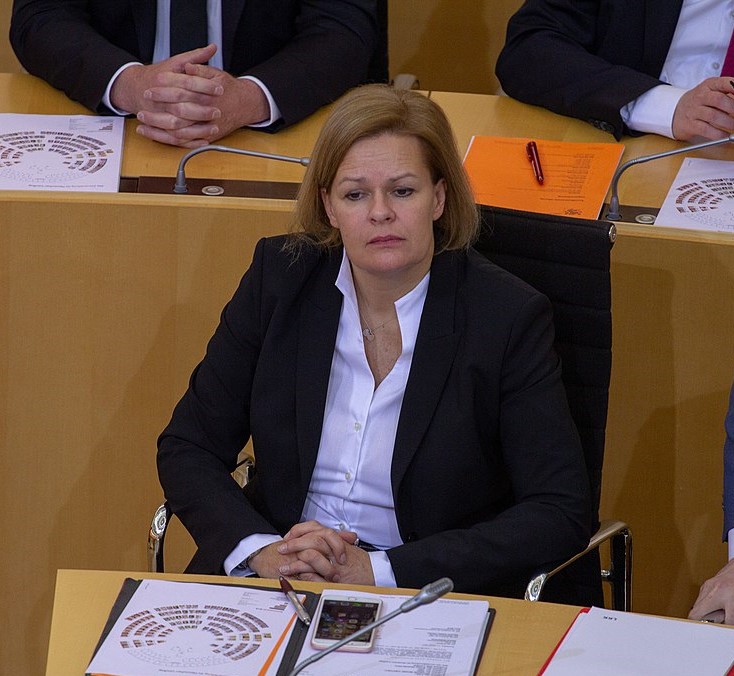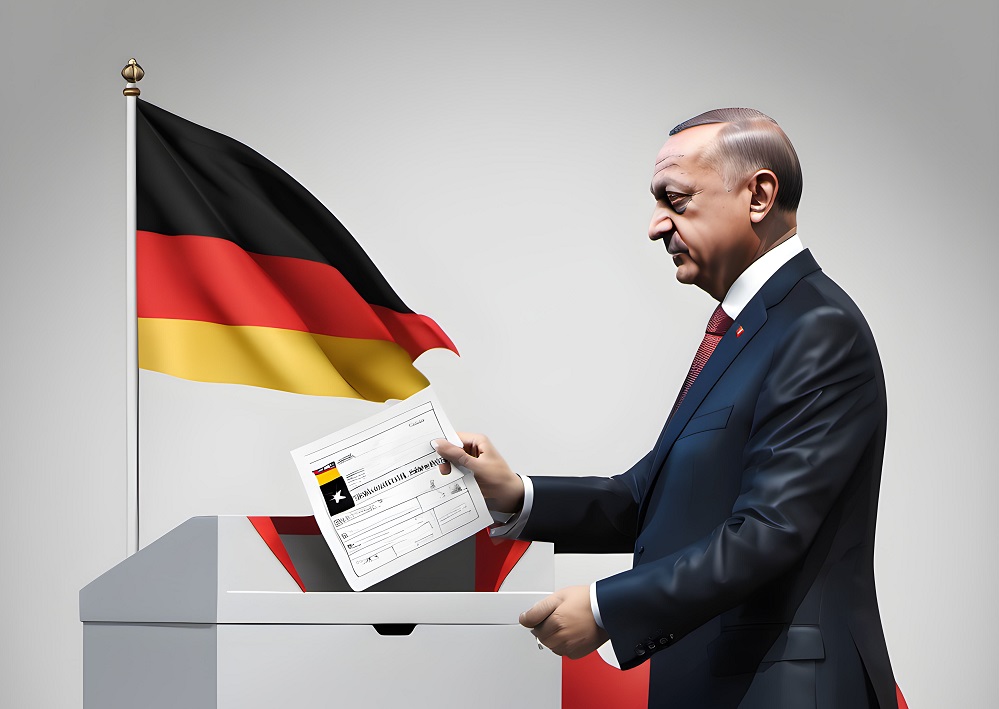A German government plan to ease citizenship requirements for millions of Turkish immigrants, German lawmakers are warning, could lead to the creation of Germany’s first national Islamist party. Such a party, they say, would be controlled by Turkish President Recep Tayyip Erdoğan and allow him to extend his already considerable influence in Germany into the Bundestag, the federal parliament.
We have to prepare ourselves for the fact that a German branch of Erdoğan’s AKP will soon sit in the German Bundestag.
Alexander Throm
The so-called Law on Citizenship Reform (Staatsangehörigkeitsreform), approved by the German Cabinet in August 2023, would allow non-EU immigrants to become naturalized German citizens without having to renounce other citizenships or give up their old passports. It would also substantially reduce the time in which immigrants are eligible for German citizenship — from eight years currently to five years, and in some cases, just three years.
The legislation, which is aimed at tackling Germany’s labor shortage by making the country a more attractive destination for foreign workers, underwent last-minute modifications in December. It is now moving through the Bundestag, where it will be voted on in coming weeks. The new law could take effect as early as April 2024.

Germany’s Interior Minister, Nancy Faeser, has defended the plan, saying her aim is to ensure that “people who have long been part of our society can also democratically shape our country.”
Not everyone is happy about the reform. Alexander Throm, domestic policy spokesman for the Christian Democratic Union (CDU), Germany’s main opposition party, noted that the new law will enable more than 2.5 million mostly Turkish immigrants to immediately obtain German citizenship. “This will not only massively change our demographics, but also the voter structure,” he warned in an interview with Bild, Germany’s largest newspaper.
Throm added that the citizenship changes would create a huge potential voter pool for Islamists tied to Erdoğan’s Justice and Development Party (AKP). “We have to prepare ourselves for the fact that a German branch of Erdoğan’s AKP will soon sit in the German Bundestag,” he said.
If 2.5 million Muslims in Germany were to vote for such a party, they could easily break the five percent electoral threshold required for parties to be eligible to enter the Bundestag. The “voter potential is there,” said Hermann Binkert, head of the INSA polling institute. “With two and a half million votes you can overcome the five percent hurdle in a federal election,” he said. Germany is home to at least 5.5 million Muslims, according to Germany’s Interior Ministry.
Erdoğan, a tireless propagator of political Islam in Europe, expends substantial resources to exert influence over the three-million-strong Turkish diaspora in Germany, especially through his control of nearly a thousand mosques in the country.
Eren Güvercin, a specialist on Turkish Islam in Germany, told Focus on Western Islamism (FWI) that Erdoğan’s principal aims are to influence German politics, spy on political opponents and garner diaspora votes to keep himself in power. This includes preventing the integration of a younger generation of Turks into German society. Erdoğan has been successful: around two-thirds of voting-age Turks in Germany cast their ballot for him in the Turkish presidential elections held in 2023.
Seyran Ateş, a Turkish-born German lawyer who founded the Berlin-based Ibn Ruschd-Goethe Mosque, Germany’s first and only liberal mosque, said that the founding of an Islamist party in Germany with links to the AKP “has been in preparation for a long time.” In an interview with WELT TV, she noted that “Erdoğan is a politician who thinks long term. He plans for the next 20 or 25 years.”
Ateş predicted that an AKP-linked Islamist party would “easily overcome the five percent hurdle and become immediately relevant in German politics.” She added that many AKP loyalists —who are already active in German politics and understand how the German political system works — would likely abandon their existing party affiliations and work closely with Erdoğan to build the new Islamist party into a “substantial political force.”
Germany’s domestic intelligence agency (Bundesamt für Verfassungsschutz, BfV) has been warning for at least two decades that Islamists in Germany are seeking to create their own political party through “massive use of naturalization.”
In its 2003 annual report, the BfV stated that Turkish Islamist groups were asking their followers to acquire German citizenship to enable “the exercise of greater political influence.” It added that Islamists were not only providing administrative support to help their members apply for citizenship, but also filing “uniform and coordinated lawsuits” to overturn rejections of naturalization applications.
The BfV said that Islamists seek citizenship to “receive all the rights of German citizens, which would strengthen their socio-political position, but above all to be protected from deportations.”
The report concluded that Islamists were pursuing a “dual strategy” to increase their influence in Germany. In public, they were presenting themselves as “moderate and open to dialogue” while in private they were “agitating against Western democratic values based on an Islamist interpretation of the Quran and Sharia.”
Previous attempts to establish Islamist parties in Germany have fared poorly. The Islamic Party of Germany (Islamische Partei Deutschlands, IPD) was created in Munich in 1998 but it failed to establish a substantial following and was abandoned in 2002. The Islam Party Germany (Islam Partei Deutschland, IPD), which was founded in Berlin in 2023 and claims to “stand for modern Islam, especially for children’s and women’s rights,” appears to be little more than a website.
The closest approximation to an Islamist party in Germany today is the Alliance for Innovation and Justice (Bündnis für Innovation und Gerechtigkeit, BIG), which was established in Cologne in 2010 and is dedicated to running Muslim candidates in state and municipal elections. BIG, which promotes multiculturalism and advocates for immigrant rights, has long been suspected of being a German branch of the AKP. A flowchart published by the German newsmagazine Der Spiegel documents BIG’s many links to Erdoğan and the AKP. BIG, which Der Spiegel describes as “Erdoğan’s lobby group,” has around 2,000 members and remains far from breaking into German politics at the federal level.
Güvercin said that previous attempts to establish an Islamist party in Germany have failed because, until now, Turkish citizens are not allowed to vote in Germany. The new citizenship law would change that. It would enable Erdogan to create an Islamist Trojan Horse in German politics.
Soeren Kern is a Middle East Forum Writing Fellow.
